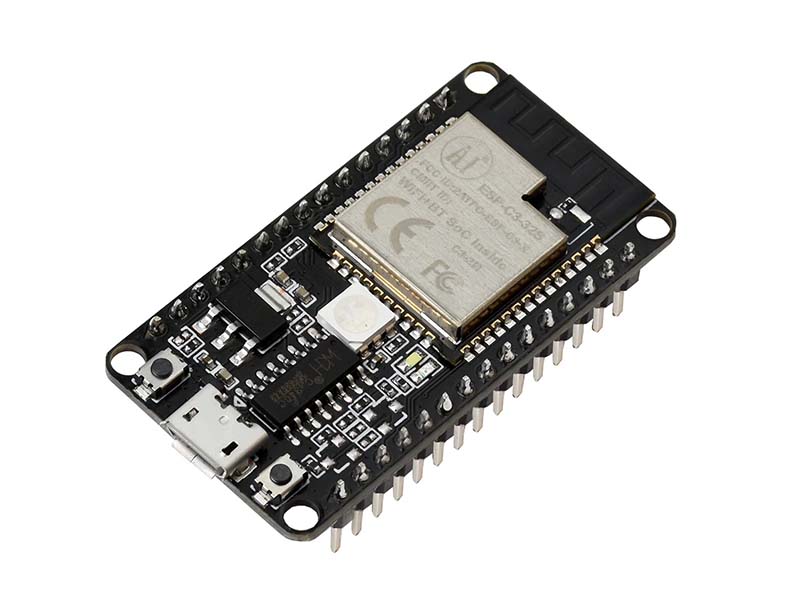
ESP-C3-32S (2M) by Ai-Thinker
This is an entry-level development board based on Espressif ESP32-C3 SoC, which is equipped with a RISC-V 32-bit single-core processor, operating frequency up to 160 MHz, supports secondary development without using other microcontrollers or processors. The ESP32-C3 is an highly integrated low power Wi-Fi and Bluetooth system-level chip (SoC), designed for various applications such as internet of things (IoT), mobile devices, wearable electronics, smart home, etc.
Features
- Onboard ESP-C3-32S module that comes with a PCB antenna
- Onboard CH340, USB to UART converter
- RGB 3-in-1 LED, convenient for secondary development
- USB port for power input, firmware programming, or UART debugging
- 2x15pin extension headers, breakout all the I/O pins of the module
- 2x keys, used as reset or user-defined
Specifications
- Complete Wi-Fi 802.11b/g/n, 1T1R mode data rate up to 150 Mbps
- Support BLE5.0 and rate support: 125 Kbps, 500 Kbps, 1 Mbps, 2 Mbps
- Onboard ESP32-C3 chip, 32-bit RISC-V single-core processor, supports a clock frequency of up to 160 MHz, with 400 KB SRAM, 384 KB ROM, 8KB RTC SRAM
- Support UART/PWM/GPIO/ADC/I2C/I2S interface, temperature sensor, pulse counter
- SMD-38 package
- Integrated Wi-Fi MAC/ BB/RF/PA/LNA/BLE
- Support multiple sleep modes, deep sleep electric current is less than 5 uA
- UART rate up to 5 Mbps
- Support STA/AP/STA+AP mode and mix mode
- Support Smart Config (APP)/AirKiss (WeChat) of Android and IOS One-click network configuration
- Support UART port local upgrade and remote firmware upgrade (FOTA)
- General AT commands can be better understand
- Support secondary development, integrated Linux development environment
- ESP-C3-32S module acquiesce in using the built-in 2 MByte Flash, meanwhile support external Flash version
Purchase
Contribute
Have some info to add for this board? Edit the source for this page here.
CircuitPython 10.1.3
This is the latest stable release of CircuitPython that will work with the ESP-C3-32S (2M). Use this release if you are new to CircuitPython.
Modules included in this download
_asyncio _pixelmap adafruit_bus_device adafruit_pixelbuf aesio alarm analogbufio analogio array atexit audiobusio audiocore audiomixer binascii bitbangio bitmaptools board builtins builtins.pow3 busdisplay busio busio.SPI busio.UART canio codeop collections digitalio displayio epaperdisplay errno espidf espnow fontio fourwire framebufferio getpass gifio hashlib i2cdisplaybus io ipaddress json keypad keypad.KeyMatrix keypad.Keys keypad.ShiftRegisterKeys keypad_demux keypad_demux.DemuxKeyMatrix locale lvfontio math mdns microcontroller msgpack neopixel_write nvm onewireio os os.getenv ps2io pulseio pwmio rainbowio random re rtc sdcardio select sharpdisplay socketpool socketpool.socketpool.AF_INET6 ssl storage struct supervisor synthio sys terminalio tilepalettemapper time touchio traceback ulab vectorio warnings watchdog wifi zlibFeatures: Breadboard-Friendly, Wi-Fi, Bluetooth/BTLE
CircuitPython 10.2.0-alpha.1
This is the latest development release of CircuitPython that will work with the ESP-C3-32S (2M).
Alpha development releases are early releases. They are unfinished, are likely to have bugs, and the features they provide may change. Beta releases may have some bugs and unfinished features, but should be suitable for many uses. A Release Candidate (rc) release is considered done and will become the next stable release, assuming no further issues are found.
Please try alpha, beta, and rc releases if you are able. Your testing is invaluable: it helps us uncover and find issues quickly.
Release Notes for 10.2.0-alpha.1
Modules included in this download
_asyncio _pixelmap adafruit_bus_device adafruit_pixelbuf aesio alarm analogbufio analogio array atexit audiobusio audiocore audiomixer binascii bitbangio bitmaptools board builtins builtins.pow3 busdisplay busio busio.SPI busio.UART canio codeop collections digitalio displayio epaperdisplay errno espidf espnow fontio fourwire framebufferio getpass gifio hashlib i2cdisplaybus io ipaddress json keypad keypad.KeyMatrix keypad.Keys keypad.ShiftRegisterKeys keypad_demux keypad_demux.DemuxKeyMatrix locale lvfontio math mdns microcontroller msgpack neopixel_write nvm onewireio os os.getenv ps2io pulseio pwmio rainbowio random re rtc sdcardio select sharpdisplay socketpool socketpool.socketpool.AF_INET6 ssl storage struct supervisor supervisor.get_setting synthio sys terminalio tilepalettemapper time touchio traceback ulab vectorio warnings watchdog wifi zlibFeatures: Breadboard-Friendly, Wi-Fi, Bluetooth/BTLE
Absolute Newest
Every time we commit new code to CircuitPython we automatically build binaries for each board and language. The binaries are stored on Amazon S3, organized by board, and then by language. These releases are even newer than the development release listed above. Try them if you want the absolute latest and are feeling daring or want to see if a problem has been fixed.
Previous Versions of CircuitPython
All previous releases of CircuitPython are available for download from Amazon S3 through the button below. For very old releases, look in the OLD/ folder for each board. Release notes for each release are available at GitHub button below.
Older releases are useful for testing if you something appears to be broken in a newer release but used to work, or if you have older code that depends on features only available in an older release. Otherwise we recommend using the latest stable release.
